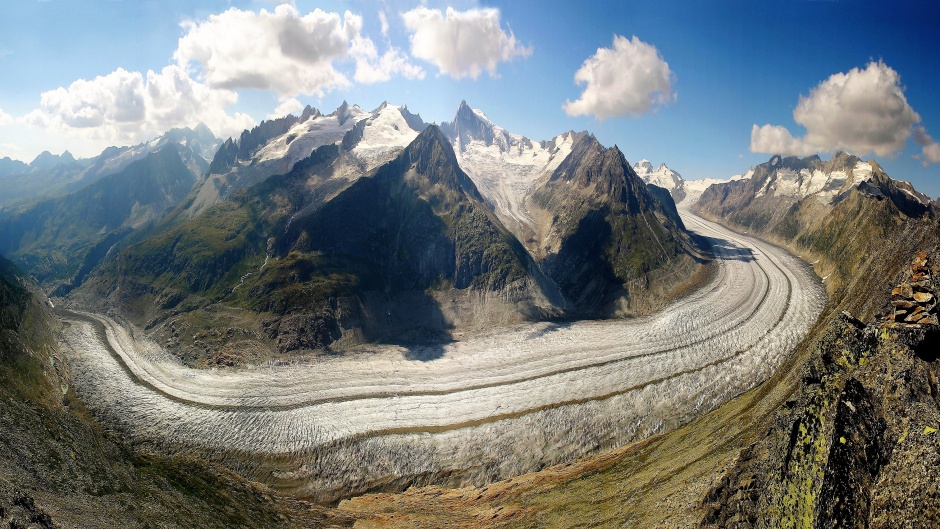Alpine ecosystem at risk: “Since 2000, glaciers have lost 17% in volume”
During this summer’s heatwaves, the melting point of ice climbed above the emblematic Mount Blanc (4,800m). Christians should lead efforts to “reduce CO2 emissions to stop this dangerous warming”, says environmentalist Steve Tanner.
22 AUGUST 2022 · 10:46 CET

One of the stories in Europe this summer has been about the melting pace of the large glaciers in the Alps.
As heatwaves in July and August reached central Europe, the altitude at which water freezes climbed up to five thousand meters, above the Mont Blanc (4,808 m), which is the highest peak of the mountain system at the heart of the continent.
A study just published says half of the volume of Swiss glaciers has been lost between 1931 and 2016. The rhythm has only accelerated in the last years.
Evangelical Focus asked an expert in Switzerland about the consequences of this trend for the Alpine ecosystem and its water reserves. Steve Tanner is the chairman of A Rocha Switzerland, a conservationist organisation with a Christian ethos.

Steve Tanner. Question. This summer, the altitude at which water freezes was measured at over 5,000 metres - compared to the normal summer levels of 3,000-3,500 metres. Why is this a problem?
Answer. This high altitude of air temperature at zero degrees means that snow or ice below this height is prone to melt. In the Alps, where the highest summit is 4800 m and most of the glaciers are located between 2600 and 4000 m, a zero degrees at more than 5000 m means that all the snow and ice volume is exposed to melting during these periods of intense heat.
If this melting cannot be compensated by precipitations during winter, the glaciers slowly disappear. This is a huge threat for them and for the whole alpine ecosystem.
Q. Why are glaciers important for the biosphere of the Alps? How could their disappearance affect other natural elements?
A. Glaciers are very important because they act as temperature regulators and water supply for the alpine environment and all the ecosystems irrigated by alpine rivers. Their natural summer melting brings fresh water to rivers and lakes, without them many alpine species adapted to low temperatures would not survive.
For instance, fishes like trouts survive thanks to fresh waters of glaciers. This natural melting is also the main source of water for rivers during summer.
If the glaciers disappear, the rivers will face severe flow reduction during summer months and will lose most of their life. The lakes will also suffer. We should not forget that in Europe, the biggest rivers like the Rhône, Rhein, Donau and Po start in the Alps.
Surface temperature anomaly in Europe, 2022 compared to 1991-2020. / Graph: Copernicus, European Union. Q. Does climate change accelerate the melting of glaciers?
A. The Alps are more vulnerable to global climate warming than the average because of local effects. While global temperature increase due to humans is measured to be 1 degree in average, it is 2 degrees in the Alps.
As the snow and ice limit goes up by 100 m for every degree of temperature increase, the limit for glaciers goes up. Since the year 2000, the alpine glaciers have lost 17% in volume. This melting rate is totally connected with global warming.
Q. How does your Christian faith and worldview influence your conservationist approach to nature?
A. By creating our world, God has made physical and biological laws and principles that we can discover through observation and reason. The extension of our understanding on how the Earth and especially the climate works, does not make us become independent from God. On the contrary, it helps us understand better His calling on us to take care of His creation.
Before knowing the fundamental effect of CO2 on the Earth climate, a phenomena that God set in place since the beginning, the humans could not understand their effect on climate. As God allowed us to know how CO2 regulates the Earth temperature, we now can understand that our exaggerated CO2 emissions warm the Earth. This places us in front of our responsibilities and demands us, especially if we are Christians, to strongly reduce our CO2 emissions to stop this dangerous warming. Our faith in God is thus at the heart of our action for Climate.
About Steve Tanner

Steve Tanner is the chairman of A Rocha Switzerland and a board member of A Rocha International. Engineer by training, he is the current Chief Technology Officer of a tech company developing and selling smart machines for sustainable farming.
He has been involved in climate action these last 10 years and enthusiastically orients his personal lifestyle towards minimal fossile energy usage.
Published in: Evangelical Focus - europe - Alpine ecosystem at risk: “Since 2000, glaciers have lost 17% in volume”
Since you are here…
Evangelical Focus is a news and opinion platform that brings together Christians from across Europe and other parts of the world. We need the support of our readers to make this media project sustainable in the long term. You can support our work! Read about Evangelical Focus’s sustainability here.
Would you like to support the work of Evangelical Focus?
Use one of these methods. You can also transfer your donation to “Areópago Protestante / Evangelical Focus” IBAN: ES8521000853530200278394 (Swift / BIC: CAIXESBBXXX). Subject: “Donation Evangelical Focus”
